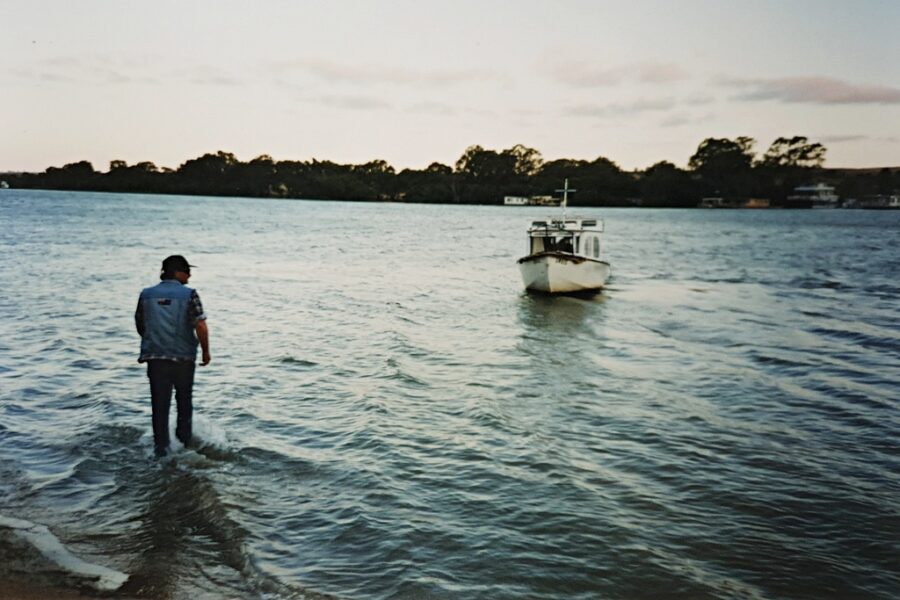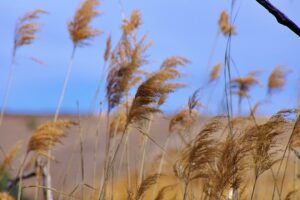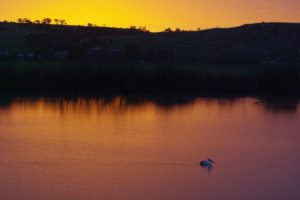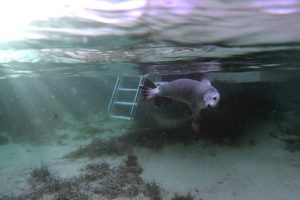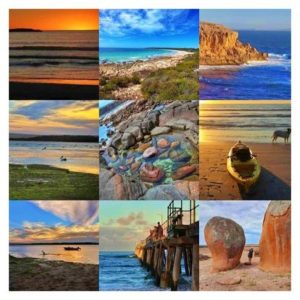Leaving the caravan park’s orange phone box in his wake, Finchy ran across the grassed sites down to the narrow sandy beach by the river.
“Fred’s on his way,” he yelled across the forty foot of water separating us.
Onboard and aware our vintage river cruiser was firmly and safely stuck, wooden keel in the sand, I disembarked too. The South Australian summer sun had bleached the life out of my denim shorts, turning them a weary shade of forget-me-not blue. My once pristine white t-shirt, bore the colourful war paint of a rogue mango fight – a testament to the day’s misadventures. I wrapped my burgundy camera-bag strap around my wrist and holding firmly onto the back deck for leverage, lowered myself over the stern. The water, cool against my skin, but not deep enough to wet my shorts, welcomed me with a gentle slap.
Wading towards Finchy, my arm up like an AFL umpire signaling the start of the game, keeping the camera bag as high as possible until I felt the dry lawn underfoot. Pentax had been the camera of choice in our family, receiving mine as a 21st birthday present ten years earlier. My old camera, nestled safe in its padded prison, had become an extension of my hand. Twice I’d circled our sunburnt country with it as my trusty companion, pushing its limits, braving the red dust plumes billowing out behind Finchy’s Harley in WA. Up in Kakadu, it shared a plastic bag with snacks in a cheap foam esky, bobbing precariously down Twin Falls Gorge on a borrowed lilo. From sun-bleached red dirt plains to tropical croc-infested rivers, this little beast had documented it all. Now, with the boat listing precariously, its task had evolved. No longer capturing pristine landscapes, it would become the chronicler of our watery adventure, a testament to both our folly and, hopefully, our survival.
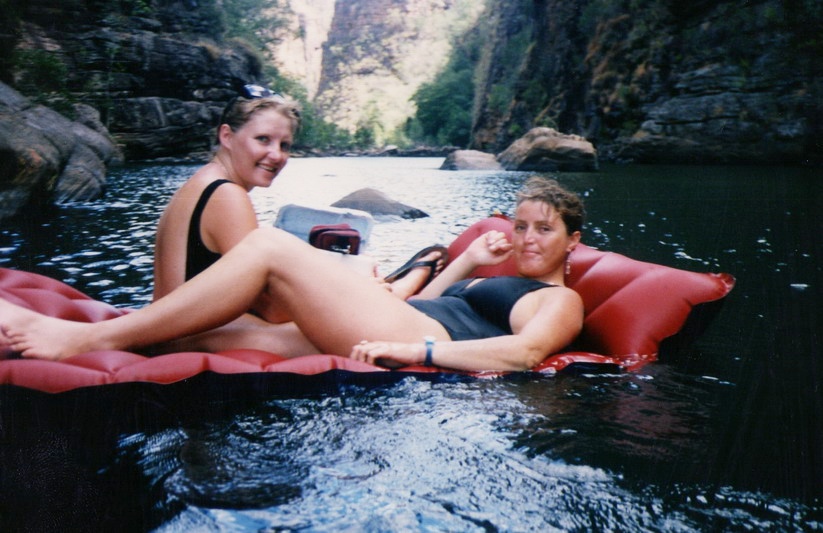
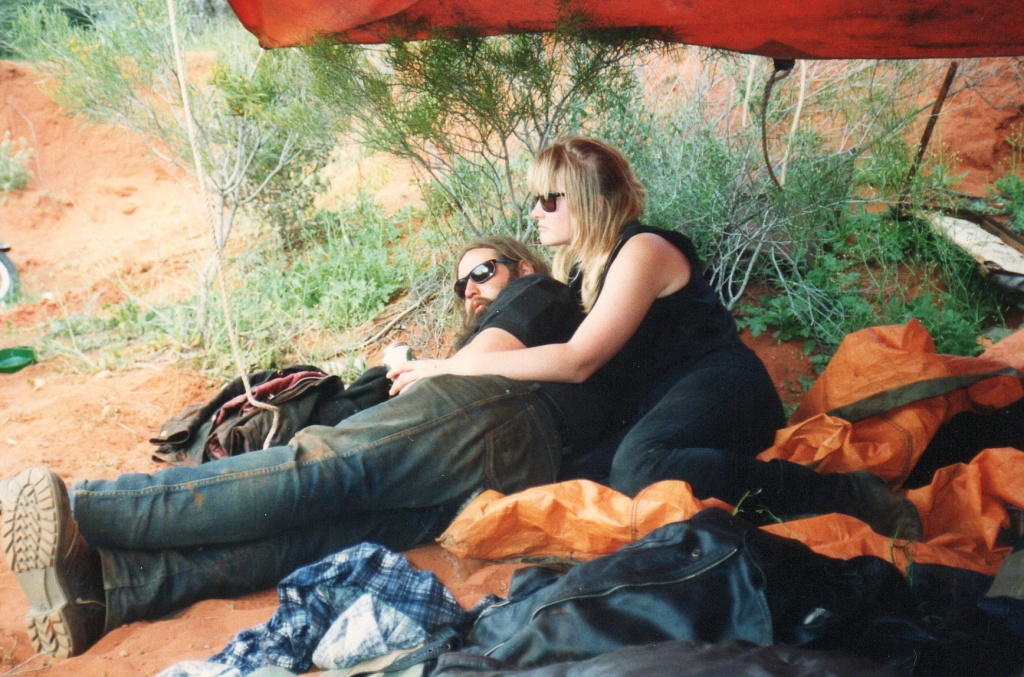
Lens up to my eye, framing Huck in her sad state in a moment of stillness and silence, an annoyed voice behind me jarred my shutter release. “You can’t moor there!” he growled. I’ll remember this moment, I thought, foreseeing the single blurred shot as I sift through the twenty-four printed photographs from my next Kodak envelope of precious memories. The caravan park manager was obviously angry, his posture and voice leaving no-one wondering. Finchy responded in an even tone, “Well mate, this isn’t just a pleasurable mooring spot we’ve picked, we are in-fact on the verge of sinking.”
“I don’t care”, he growled again, “You can’t stay there”!
Fred rolled up in his ute, leaving the driver’s door ajar like a forgotten durry. Finchy had already filled me in on their phone conversation. Apparently, Fred had shadowed us like a nervous bodyguard, following us along the river from Younghusband by road. He’d seen us make it safely to Mannum so he returned home, only to receive the mayday call from Finchy. “Taken on much water?” Fred had asked, his voice shaky with concern. “Has she ever,” Finchy replied.
The park owner, a man whose face resembled a poorly fermented cabbage, renewed his assault. “You can’t just leave that boat there!” he bellowed, indignation ballooning in his polyester shirt. Stepping towards him, Finchy, about to unleash a verbal typhoon telling him in no uncertain terms what he could do with his caravan park, stopped, as Fred sauntered past. Eyes focused on Huck and in a voice as smooth as river pebbles, Fred calmly advised the bloke that a stricken vessel can legally moor wherever its broken heart desires. Sensing Fred’s knowledge on such matters and possibly, a tide he couldn’t control in Finchy, the angry park owner retreated with a grumble.
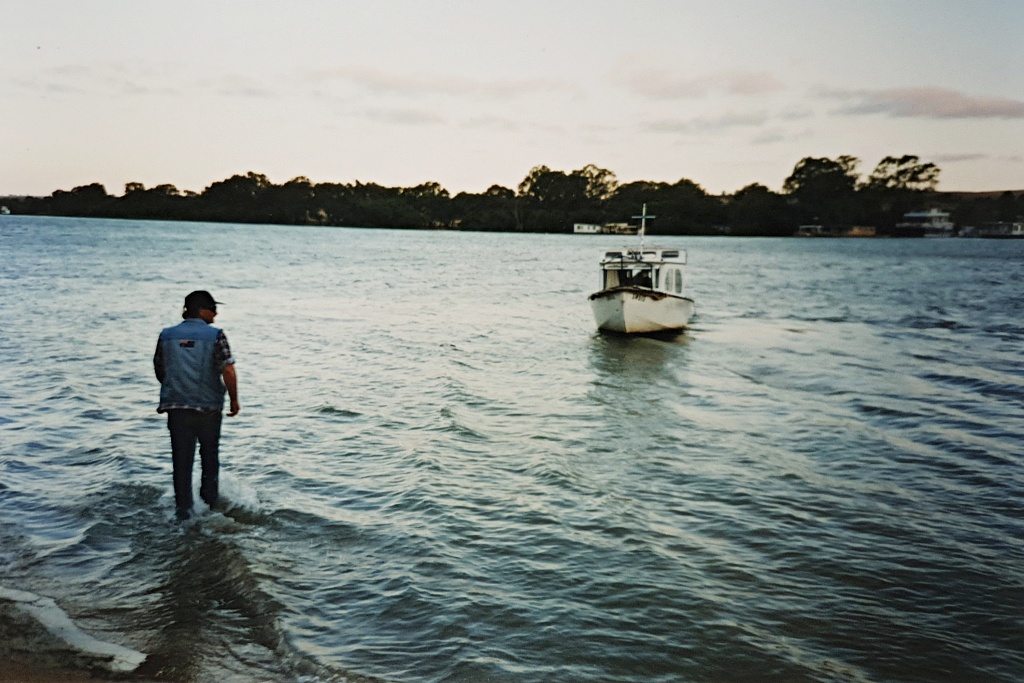
A younger bloke appeared from nowhere and stood beside Fred. Barefoot in blue cut-off jeans, brown curls bouncing from under a wide brimmed hat and holding a battery and a pump like offerings to a river god. “This is Jerome,” Fred declared.
I watched in amazement as these two blokes I barely knew offered their aid without question.
Jerome, a bloke who spoke the language of boats with the fluency of a seasoned sailor, joined Fred in expelling the water from Huck’s belly. We watched, sponges absorbing knowledge, as they expertly applied a temporary patch to the hole in the hull. Two pieces of plywood, a prayer in buttered putty, and a handful of screws – a simple plywood sandwich solution born from experience and camaraderie.
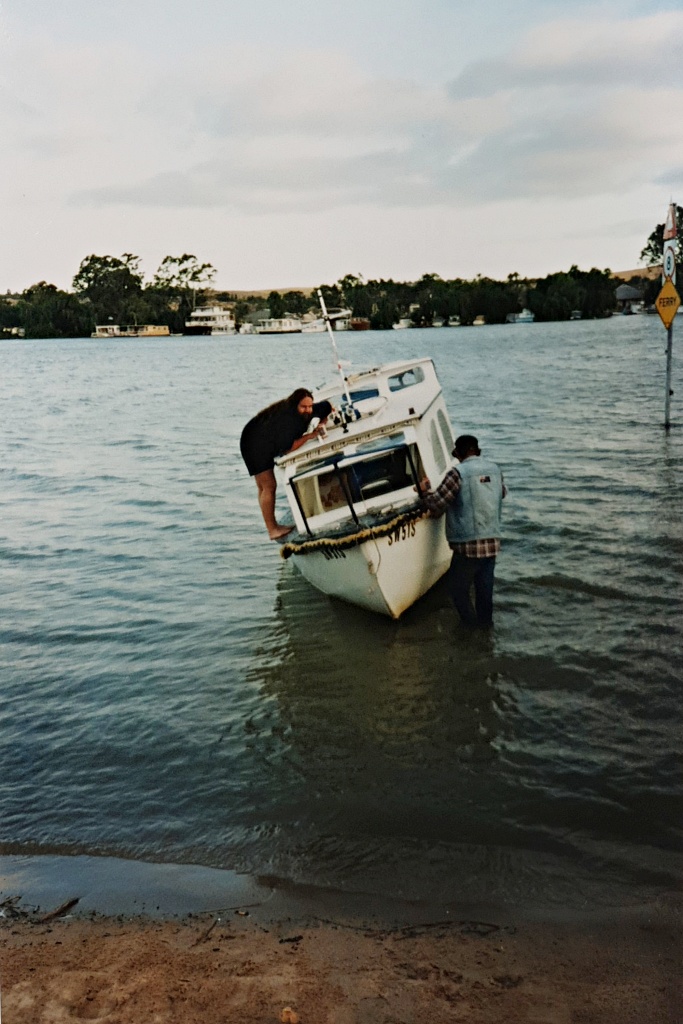
Jerome disappeared like a puff of smoke, much the way he had arrived. Finchy and I clambered back onboard to make sure Huck wasn’t taking on any water. I’d left the seat covers off, as I needed a clear view to check the new plywood patch from the inside. Finchy, ever the loyal first mate, coaxed the Blaxland back to life. Our plan was to move Huck to a more sheltered spot across the river under the willows and away from the caravan park.
Standing on the rear deck, two shipwrecked buccaneers, all grace abandoned while trying to be as heavy as a pair of hippo’s. Our combined weight, we hoped, would coax the front of the boat, twenty two feet away from us, to lift up, freeing the hull from the sucking sand. Fred, waded into the river, wet jeans clinging to his legs like a second skin. With a grunt that would have done a water buffalo proud, he heaved against the bow, lifting as well, to set the boat free into deeper water.
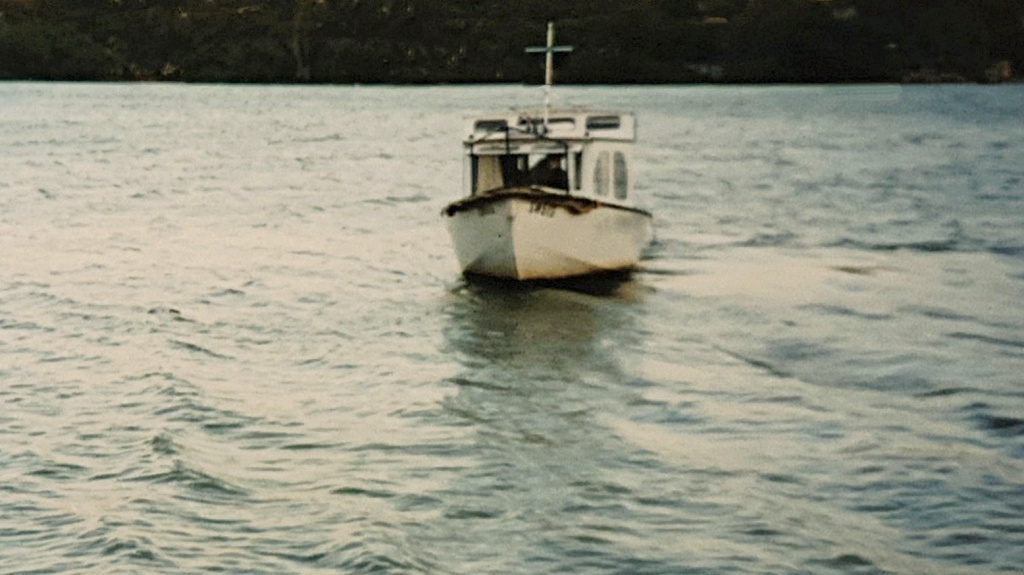
I was terrified. The 300m journey across the river seemed like an eternity. I had grown up by the sea and was not at all familiar with the river. Both riverbanks were in view but I knew there was deep water below us. Finchy, however had a real affinity with the river, always first in and last out. His love of the river comes from his father, Wally, who took their family on many Murray River houseboat holidays during the seventies. Hiring from the Liba-Liba houseboat fleet, Wally had described to me after learning of our proposed adventure, how they were mostly powered by Holden 186 red motors, the same engine in my first car.
Finchy didn’t say much on the crossing.
The irrepressible rascal had vanished, replaced by a man on a mission. The usual glint of mischief in his mellow brown eyes replaced by steely resolve. This was serious. The distant shore shimmered with the promise of sanctuary despite the dread, coiled tight in my gut.
Only the slightest of movement could be seen through the weeping willows, their long swaying branches a curtain concealing the lumbering boat. The two river ferries faster in their ever-crossing shuffle, carrying cars from one side of the river to the other.
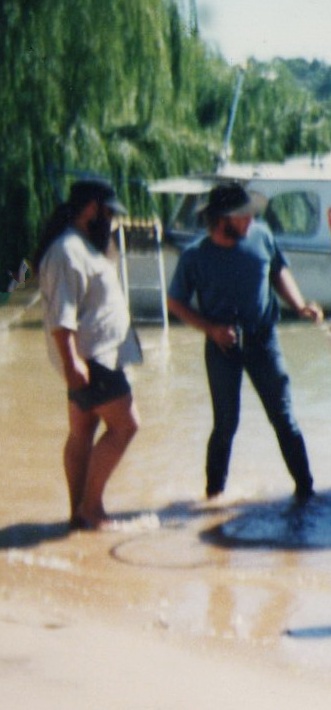
Fred. A name etched in the annals of that first, ramshackle night. He turned out to be invaluable help on that first day. He steered us not just to a haven beneath the weeping willows, but his generosity became a beacon in the darkness, bringing blankets for us from his home on our first night beneath the watchful eye of a million stars.
We were extremely grateful for his thoughtfulness. We didn’t have anything with us except our wallets, car keys and camera. Pockets as bare as the hull, car keys that wouldn’t unlock a damn thing on the water and a camera, a reminder of the creature comforts of home we’d left behind.
We watched the last orange rays of sun dance through the weeping willows, casting flickering shadows on the cramped cabin walls. The four of us sat in Huck, gently rocking back and forth from the rhythmic wake of the two ferries downstream. Finchy, a man built like a brick wall, and myself, wrapped in one of Fred’s blankets, sat shoulder to shoulder as Fred and Jerome spun yarns of this magnificent Murray River. Tales about building locks and channels and secrets of its shifting snags and sandbars.
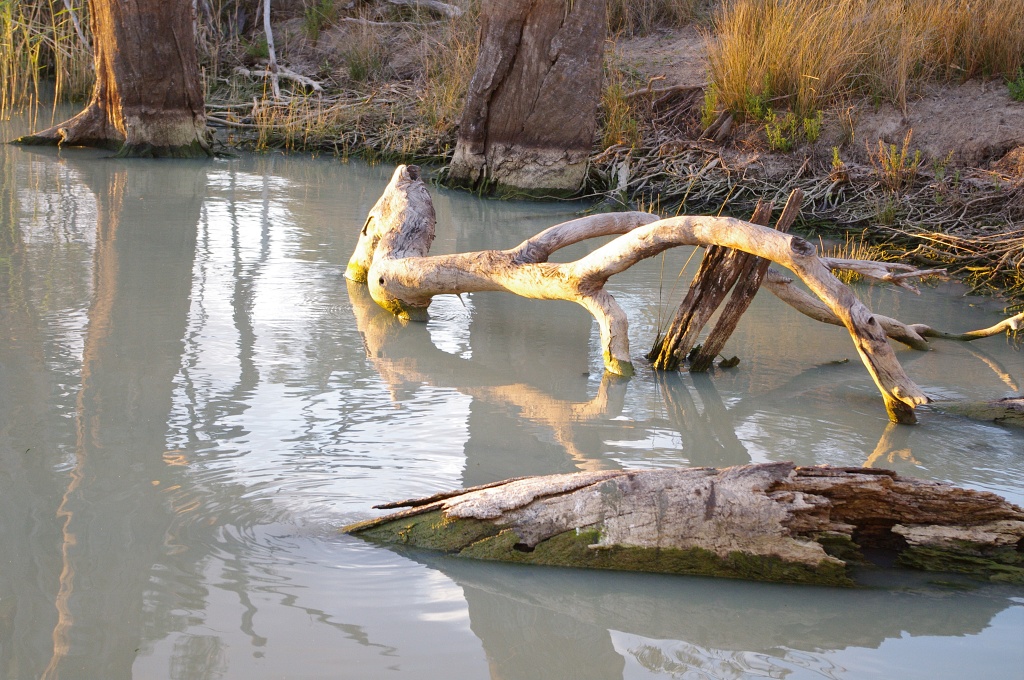
During those hours past sunset, I watched by candlelight, the men’s calloused hands upend endless bottles of beer while having the odd bourbon myself. Together we laughed our way into the wee hours each telling our unique stories of travel and adventure. We spoke of dusty roads and sun-bleached landscapes and stories of chance encounters. They spoke not only with words, but with the ghosts of keels that had kissed the riverbed and weathered river captains whose laughter, etched deep in the groaning timbers of paddle-steamers and boats like old Huck. Each tale a testament to the pull of life on the river, once felt, could never be forgotten Jerome assured us.
Reminiscing, Fred said he had renamed the boat, Huck Finn, after the mischievous character in Mark Twain’s novel. She was a wooden boat and 23 feet long he said. Looking at the interior while we chatted and joked like old friends, I guessed the small cabin to be about 5 foot wide by 7 foot long. The roof had about 4 foot 11 inches of head room. Another guess, as I’m only five foot tall, I couldn’t quite stand up and had to walk with a slight stoop coming in. The blokes had to bend a lot more going out to relieve themselves over the side in the darkness. The cabin was a triangle shape and had a narrow seat on each side under the windows. The seating didn’t leave much elbow room for the four of us and the V bottom hull seemed to have more roll than the early settlers as the night progressed.
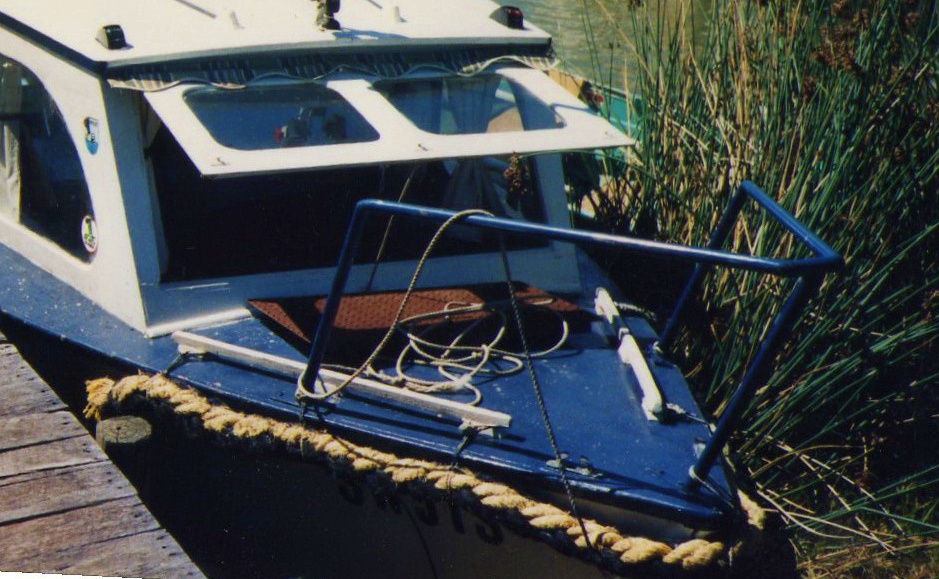
The front of the cabin had a push out window that reminded me of an old land rover on the farm where I grew up. One bed had a small wardrobe and a narrow shelf by its foot. At the other end near the front window was a small steering wheel, not connected to the tiller anymore. One of the many things that still needed restoration Fred said.
The second bed’s foot end had a half cupboard with a lift up lid. Under the lid sat a little double burner gas stove. This was to be our kitchen. No fridge, no sink, no bench space. The cabin had four side windows, two on each side that had curtains on them. Under the front two windows were small inset shelves, a book nook for each bunk.
The cabin had a narrow door and two tiny steps out to the back half of the boat. All under cover, the three open sides had drop down canvas blinds and narrow bench seats. All the seating inside and out had storage underneath. Right at the back of the boat was a flat area with no roof, perfect for piddling over the side, and the tiller. The handle a beautiful long, curved piece of timber worn smooth from forty years of strong hands steering the boat up and down the river. A trap for unsuspecting piddlers in the dark, the tiller could move with the motion of the current on the rudder and sweep unsteady ankles off balance.
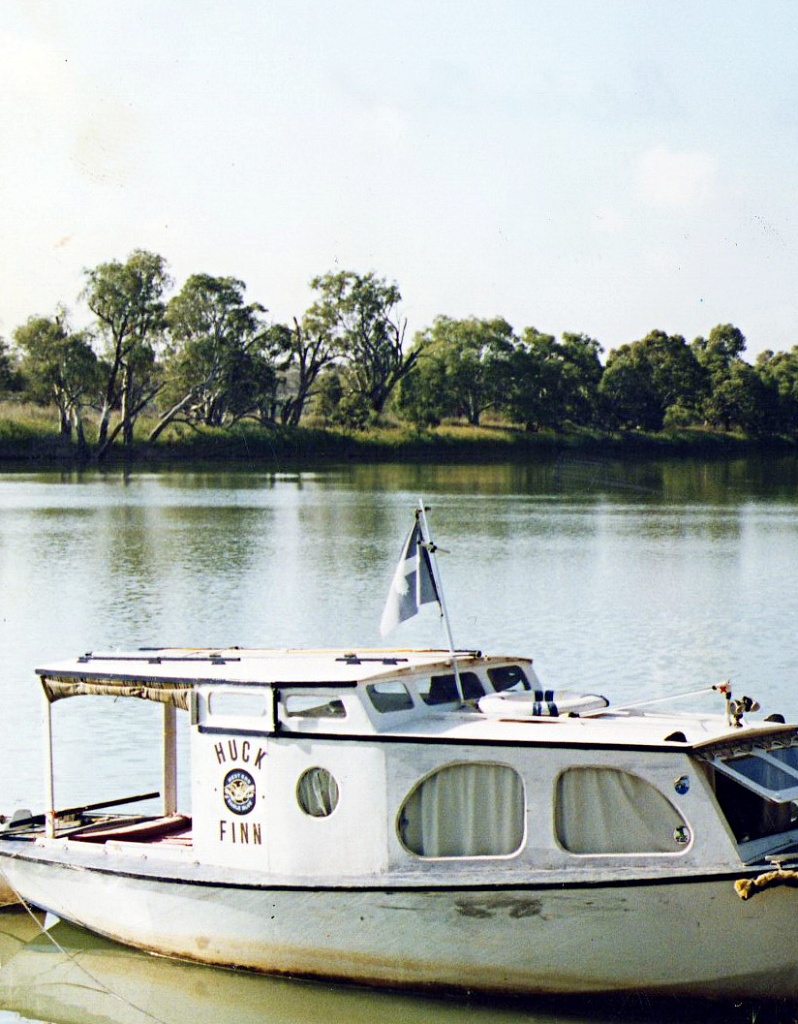
During discussions of the day’s mishap, Fred told us Captain Sturt had encountered a spot of bad luck during his expedition of the river in 1830. In a 25foot whaleboat with a crew of seven men, they were put ashore for three days on the same notorious stretch of river known as Pellaring Reach. The winds on this exposed section of reach, combined with the strong currents, can make it extremely dangerous he said.
“You gotta look out for stuff on the river,” Fred instructed me, and proceeded with a long list of other things we could hit or that might cause us trouble in a wooden v-bottom boat. He went on, “Other boats, ski boats, skiers, skier’s wakes, skier’s biscuits, swimmers, birds, nets, floats, sandbars, floating debris, kayakers, canoeists, fisherman, snags, ferries, locks, training spurs, houseboats and paddle-steamers”.
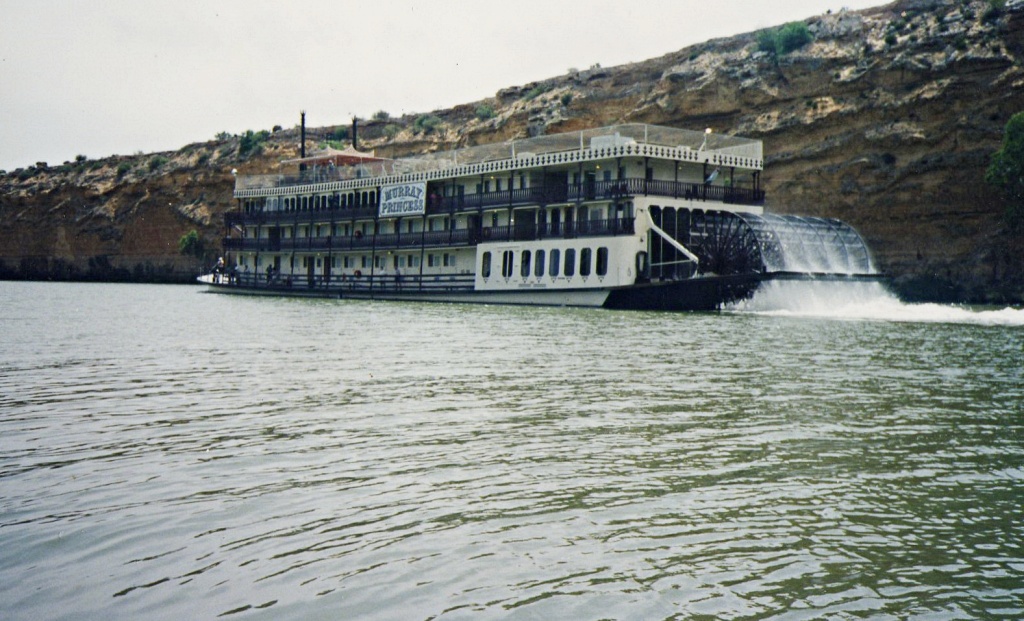
The most valuable lesson I learnt today was always be prepared for the unexpected. We’d been as lucky as a stray cat with nine lives for not needing the life jackets stowed on board. I will never forget this experience. Never again will I be caught so woefully unprepared. Never again will I take the simple grace of existence for granted. The river may have threatened to swallow us whole, but instead, it gifted us with a new appreciation and a new found friend. Fred, our unlikely saviour. Steering us not just from the perils of the river, but the harsher currents of unpreparedness. Fred came to our rescue when we needed him most, and we’ll never forget his kindness.
Click on the link below for the next episode
Or click on the tag below ‘Floating through River Life’ below to see all Episodes

